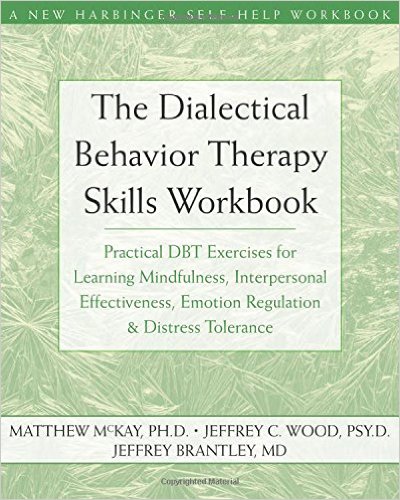 |  | The Dialectical Behavior Therapy Workbook
Author: Matthew McKay, Ph.D., Jeffrey C. Wood, M.D., and Jeffrey Brantley, M.D.
Publisher: New Harbinger Publications; 1 edition (July1, 2007)
Paperback: 248 pages
ISBN-10: 1572245131
ISBN-13: 978-1572245136


|
Book DescriptionDialectical behavior therapy, though originally created for treatment of Borderline Personality Disorder, has been effective at helping many other psychological disorders. Research shows that DBT, as outlined in this workbook, can help those suffering from intense emotions and stress. Instead of losing control or resorting to destructive coping mechanisms, the goal of DBT is to increase your ability to handle distress. This book helps you to build skills in the areas of distress tolerance, mindfulness, emotion regulation, and interpersonal effectiveness.
The workbook expounds on direct steps and exercises, from easier introductory exercises to more advanced skills in later chapters. DBT can be very effective at helping you handle emotions, and this workbook may be an effective tool to help.
About the AuthorsDr. Matthew McKay, Ph.D., holds his doctorate in clinical psychology from the California School of Professional Psychology. He specializes in cognitive behavioral therapy to treat depression and anxiety. Additionally, he is an author and co-author of many books, including
The Relaxation and Stress Reduction Workbook, Self-Esteem, Thoughts and Feelings, When Anger Hurts, and
ACT on Life Not on Anger, and is also a professor at the Wright Institute, a clinical psychology graduate school, in Berkeley, CA.
Dr. Jeffrey C. Wood, Psy.D., a clinical psychologist who specializes in the use of Cognitive Behavioral Therapy and Dialectical Behavior Therapy for the treatment of mood and anxiety disorders, trauma, chronic pain, and personality disorders. He is also a part-time professor at the Wright Institute, a clinical psychology graduate school, in Berkeley, California.
Dr. Jeffrey Brantley, M.D., a consulting associate in the Duke Department of Psychiatry, also founded and directs the mindfulness-based stress reduction program at Duke University’s Center for Integrative Medicine. In addition, he has also authored several other titles including
Calming Your Anxious Mind, Daily Meditations for Calming Your Anxious Mind. 




 Poll
Poll
